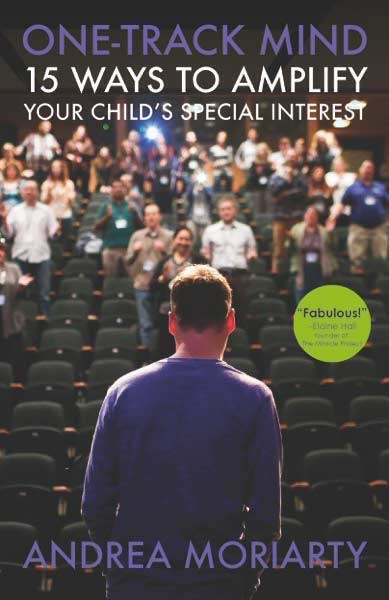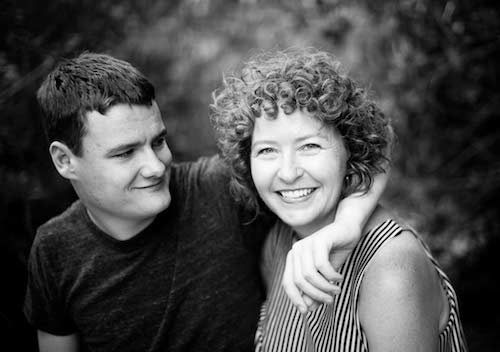The Magic of Music Therapy for Kids with Special Needs

Happy St. Patty’s Day to everyone! Today’s post about the power of music, something the residents of the Emerald Isle have known for centuries, comes from Andrea Moriarty. She is the co-founder of the music therapy nonprofit Banding Together and mother of a son with special needs. Below, Moriarty shares an excerpt from her new book, One-Track Mind: 15 Ways to Amplify Your Child’s Special Interest. With the benefit of hindsight, Moriarty outlines the power of music therapy and strategies her family discovered to maximize their son’s strengths to discover purpose.
Taking a Tip from Disney
If you’ve watched as much bonus material on two-disc collector’s edition versions of Disney films as we have, you have heard composer Richard Sherman explain that Walt insisted the music move the plot forward. Sherman explains, “A successful song for a musical is not just pleasant listening. It tells a story, conveys character and personality. It’s the most difficult thing to do. You’re writing the whole book on the head of a pin.” The songs our music therapist helped my son compose were certainly moving the plot line of his life forward.
Music Generalizes Skills
Through a side-door miracle of sorts, after being in private special education settings for most of his life, Reid attended a highly competitive public high school with more than 2,500 students for his last two years in the system. He expressed interest in entering their “Idol” singing contest, modeled after the popular television show. Generalizing his musical skills to a new setting with many new people, he performed his original song, “Shine,” for the first time without his longtime music therapist, his band, or me present. This huge milestone came after significant consternation and anxiety. He wavered all morning in anguished self-talk.
Music Motivates Behavior
His aide texted me status updates. “He says he’s too nervous.”
I texted back, “That’s common; don’t offer any rewards or appear to make him do it. Just let him talk it through by himself. He usually decides to do it in the eleventh hour, as long as it’s his own choice.” Only I wasn’t sure if he would this time, without any of his usual entourage. I had to let it go. “Tell him it’s up to him.”
Then at last, the reply I wanted to read from around the corner where I was parked: “He’s gonna do it. He’s going up.”
At the last minute, from a concrete slab amphitheater in the center of the grassy quad, Reid announced to the gathered student body that he would sing “Shine” a cappella. That was a first! The song itself became the constant amid numerous other variables, including the spotty sound system.
Music Communicates Volumes
In essence, he was introducing himself at this new school, telling his story to a group of typical teens at lunchtime through the lyrics Angela and he had written. They had done what composer Eric Whitacre suggests, “Write the music your inside-you needs your outside-you to hear.”
You can do it if you really try
Don’t give up, reach for the sky
A spark in you has begun to grow
Shout it for the world to know, you’re gonna
Shine……Shine……Shine
Sing with your heart
Play your part
Jump to your feet
Dance in the street
Don’t be afraid
Let others see
The dreams you have
What you could be
Music Facilitates Inclusion
Apparently, the throngs of students stood to applaud, surely never imagining that the conspicuous boy they passed in the halls with his own instructional aide was capable of this. They texted me a photo of him post-performance, adrenaline rushing, arm in arm between his vocal coach and the school band teacher, who was one of the judges. It wasn’t about winning that day, but rather being included, mastering independence, and generalizing his musicianship to a new crowd and venue. Frank Sinatra’s words rang true, “If I can make it there, I’ll make it anywhere…”
Music Therapy is Magic
There are seven reasons music therapy is the magic in our story. Music therapy:
- Addresses practically any IEP goal.
- Is innately pleasurable; music is its own reward.
- Employs a relative strength.
- Utilizes the whole brain.
- Adapts through one’s lifespan.
- Generalizes easily outside the clinic.
- Allows for structure and creativity simultaneously.
Your Experience with Music Therapy?
Has your child benefited from music therapy? Andrea would love to hear your story if you’d like to share it in the comment box.
Do you like what you see at DifferentDream.com? You can receive more great content by subscribing to the quarterly Different Dream newsletter and signing up for the daily RSS feed delivered to your email inbox. You can sign up for the first in the pop up box and the second at the bottom of this page.

By Andrea Moriarty
Andrea Moriarty recently published One-Track Mind: 15 Ways to Amplify Your Child’s Special Interest. She blogs at Autism Unplugged about both the challenges and triumphs of parenting a differently-abled child while offering affectionate humor and unending hope. Moriarty and her husband Jim are the proud adoptive parents of twins, Allie and Reid. Allie currently studies music education and music therapy at Berklee College of Music in Boston. Reid makes music, performs regularly, and hosts his own podcast: Talk Time with Reid Moriarty. Moriarty lives in Solana Beach, California, where she accumulates books, cooks from scratch, and whistles while she works. You can learn more about Andrea at her website, www.andreamoriarty.com.
Subscribe for Updates from Jolene
Related Posts
It’s Going to Be a Different Kind of Mother’s Day
With her mother ailing, Jolene knows it’s going to be a different kind of Mother’s Day—one like when her son was small and fragile.
I Am the Best Mom in The World
Guest blogger Valeria Conshafter explains her confidence in being able to say, “I am the best mom in the world.”
Empowering Kids with Disabilities, Part 3: Power and Self-Worth
In this third post in a series, Jolene explains how empowering kids with disabilities takes place when they have power and self-worth.






0 Comments